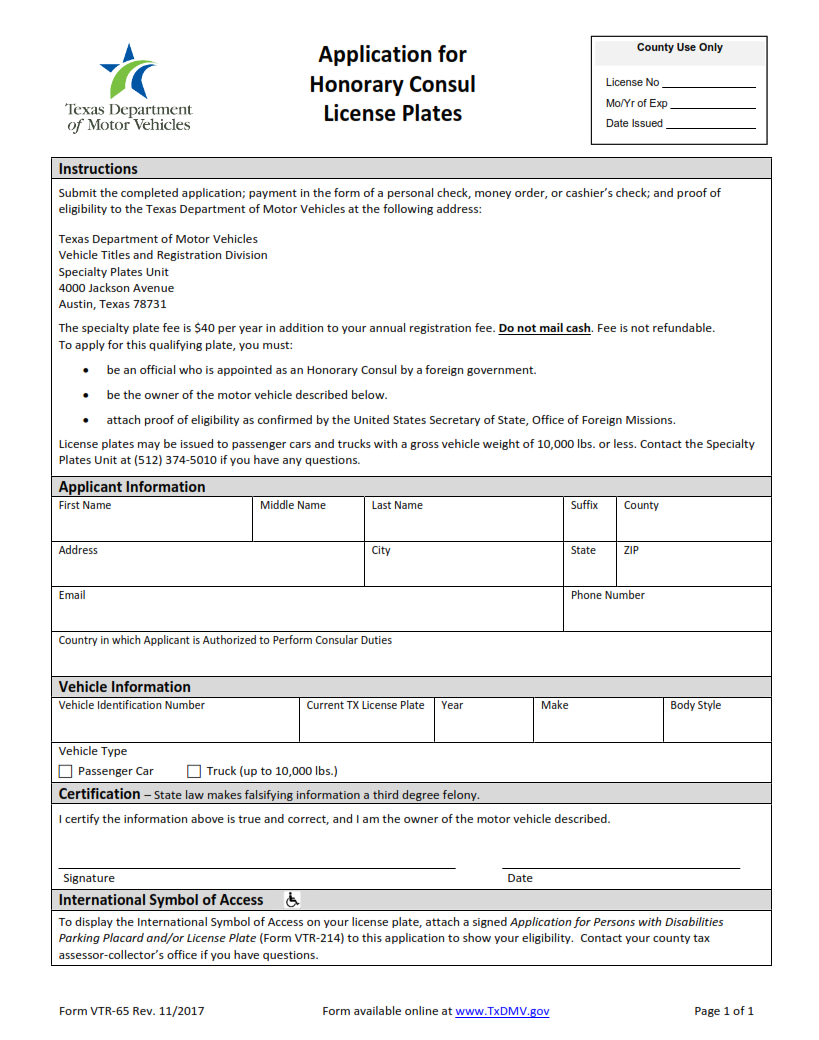ORIGINFORMSTUDIO.COM – VTR-267 – Additional Liens Statement – VTR-65 offers a unique opportunity for individuals to become honorary consuls through a special license plate program. This article will explain the requirements and process of obtaining an honorary consul license plate, as well as its benefits. An honorary consul is someone who acts on behalf of their country in matters related to commercial, cultural, or diplomatic affairs. With the VTR-65 application, applicants can demonstrate their commitment to their home nation and receive recognition for their service.
Download VTR-65 – Application for Honorary Consul License Plates
| Form Number | VTR-65 |
| Form Title | Application for Honorary Consul License Plates |
| File Size | 1 MB |
| Form By | Texas DMV Form |
What is a VTR-65 Form?
A VTR-65 form is an application for Honorary Consul License Plates. This form is used in the US State of Texas and must be filed with the state’s Department of Motor Vehicles. The VTR-65 is specifically designated for those serving as Honorary Consuls, which are individuals appointed by a foreign government to serve as their representative within a specific geographical area. The application requires official documentation from both the applicant and the foreign government appointing them, including a valid passport or driver’s license, proof of residency in the state of Texas, and documents from the foreign government showing that they have been appointed as an Honorary Consul.
The purpose of this form is to allow Honorary Consuls to drive in Texas with their own set of plates indicating their status as representatives from another nation.
What is the Purpose of the VTR-65 Form?
The VTR-65 form is an application for the Texas Department of Motor Vehicles that allows for honorary consul license plates to be issued. It is a necessary step in obtaining these special plates. The purpose of the form is to provide information about the applicant and their eligibility for this plate type.
The first section of the VTR-65 requires applicants to fill out personal information such as name, date of birth, address, and driver’s license number. This part also asks for the country or organization associated with the individual’s role as a consul. The second section involves attaching proof of consulate status from official documentation provided by either a foreign government or international organization like United Nations (UN). Lastly, applicants must sign off on all paperwork before submitting it to the DMV office.
Where Can I Find a VTR-65 Form?
The VTR-65 form, also known as the Application for Honorary Consul License Plates, is a necessary form to obtain Honorary Consul License Plates in Texas. The form requests information such as name, address, vehicle information and other relevant details related to the application.
For those looking to obtain Honorary Consul License Plates in Texas, the VTR-65 form can be found on the Texas Department of Motor Vehicles (TxDMV) website for download and print. After filling out the required information on the VTR-65 form, it needs to be mailed along with payment (if applicable) to TxDMV Regional Service Centers or sent electronically through their online services portal.
VTR-65 – Application for Honorary Consul License Plates
The VTR-65 application is a form that can be used to apply for Honorary Consul License Plates from the Texas Department of Motor Vehicles. These plates are issued on an annual basis to members of the International Organization for Migration or their family members who are designated as honorary consuls by foreign governments in Texas. The plates allow these individuals to display and identify themselves as representatives of their respective governments while operating a motor vehicle on public roads in the state.
In order to be eligible, applicants must first download and complete the VTR-65 form from the official website and submit it along with all required documents. This includes proof of identity, proof of honorarium payment and proof that they have been appointed by a foreign government or organization. Additionally, applicants may also need to provide other documentation such as power of attorney forms and/or authorization letters from their respective governments or organizations.
VTR-65 Form Example
